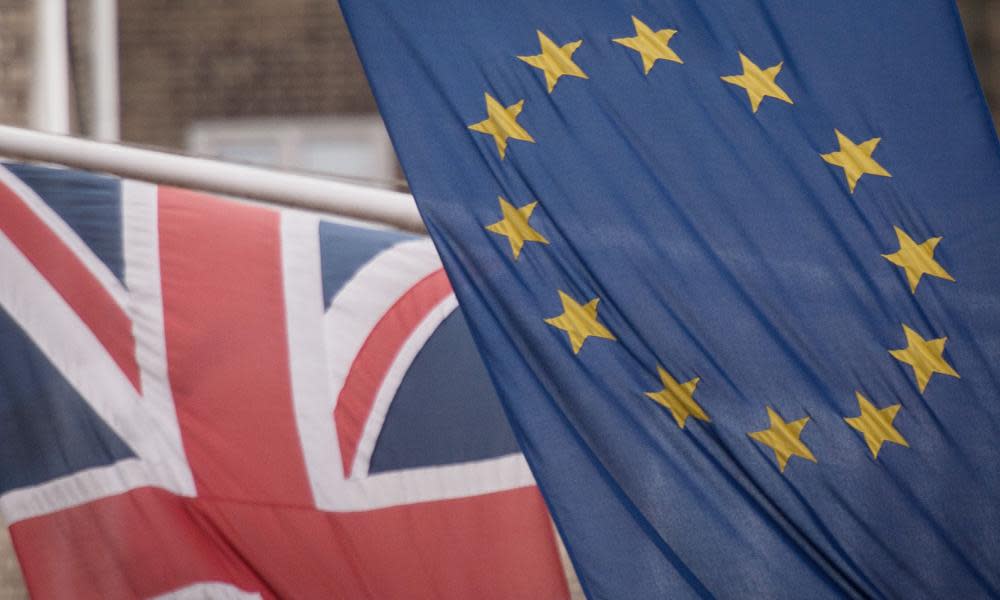Hard Brexit highly damaging, says former top civil servant

There is no trade deal on offer from the European Union that will stop Britain taking a major economic hit after Brexit, the government’s former top trade official has warned.
In a direct warning to MPs, Sir Martin Donnelly, the chief civil servant in Liam Fox’s Department for International Trade until earlier this year, states that leaving the single market in favour of negotiating a long-winded, Canada-style trade deal will “damage UK competitiveness and leave us with less investment, lower living standards and long queues at the border”.
Donnelly, who left the trade department earlier this year and who has extensive experience working in Brussels, writes in the Observer that there is no credible free trade deal on offer “able to deliver the guaranteed market access, shared regulation and consumer protection that Britain needs”.
“Vote to leave the single market if you must. But do it with your eyes open,” he tells MPs. “Wishful thinking does not create well-paid jobs, pay taxes or fund public services.”
He warns that leaving the EU’s legal structures will leave Britain “more protected, more regulated and poorer”.
His intervention comes days after a leaked European commission document suggested that Britain would not be offered a bespoke trade deal granting access to the single market for goods and services. It also comes with the government fighting to contain a Brexit crisis on several fronts: it could face a Commons defeat as early as Tuesday over a rebel attempt to ensure that the EU’s Charter of Fundamental Rights continues to have effect after Brexit.
The Observer has also learned that senior legal figures in the Lords are poised to ensure that rulings by the European Court of Justice (ECJ) still have a place in UK courts after Brexit.
Lord Pannick QC, who defeated the government in court over its attempt to trigger Brexit without a vote in parliament, said he would step in to change the EU withdrawal bill if ministers did not clarify the “uncertainty” over EU law after Brexit day.
“We need clarity on whether judges should, other than in exceptional circumstances, follow judgments of the European Court of Justice on the retained EU law which will be part of domestic law after Brexit,” he said. “[The current bill] gives inadequate guidance to our judges.
“When the withdrawal bill comes to the House of Lords, I will be tabling an amendment to require domestic courts to interpret retained EU law consistently with the judgments of the court of justice handed down post-Brexit, unless the domestic court is satisfied that there are exceptional reasons not to do so.
“Such an amendment is designed to promote legal certainty, and to ensure consistency between the retained EU law and the same laws in Europe, which is especially important to promote trade with Europe, to ensure freedom of services, for data protection, safeguarding the environment, protecting employment rights and in many other fields.”

That move will infuriate Brexiters and also contradicts Theresa May, who has made jurisdiction of the ECJ a red line in Brexit talks.
Meanwhile, senior ministers will have a crunch meeting on Mondayover how to unlock Brexit talks with the EU, with foreign secretary Boris Johnson wanting guarantees over a future trade deal before committing to a major increase in the divorce bill.
In his Observer article, Donnelly spells out that the benefits Britain enjoys from its single market membership cannot be replicated in a trade deal. He urges MPs unsure about what form the final Brexit deal should take to buy themselves time by backing temporary membership of the European Economic Area, which comes with single market access, for a transition period. Doing so will allow more time to “see if we can find a realistic alternative that meets our economic needs”.
“Please don’t throw away our hard-won competitiveness, our knowledge-based economy which attracts global talent and investment, and our successful services sector because of false promises that we can leave the single market and everything will be fine,” he warns MPs. “That is not what the facts tell us.”
A similar warning has already been issued by Sir Ivan Rogers, the former ambassador to the EU, who said that there was a “radical difference” between the free trade arrangement that Britain would be offered and membership of the customs union and the single market that it was giving up.
A senior EU official hit back against David Davis’s claim during a speech in Berlin last week that the UK should enjoy a better deal than Norway, due to its comparative size. The official in Brussels told the Observer, however, that suggestions from British politicians that the UK could remodel its economy to be more like Singapore had cut through to EU leaders.
“They are saying ‘But we are a big country so we can get something better than Norway’. My answer is ‘no, it is the other way round’. Norway is a fisheries and oil economy. They are not a competitor. You, the UK, are a competitor. Particularly when it comes to safeguards against various types of dumping. Threats have been made and safeguards will have to be introduced.”
Meanwhile, businesses are also increasing their lobbying over the effects of leaving the EU with no deal. The tourism industry has privately warned that 25,000 jobs held by Britons working in the industry in Europe, as well as £1bn in tax revenue, are at risk.
Eloise Todd, head of the pro-Remain Best for Britain campaign, said: “In the week of the budget, this is further evidence that we are facing a Brexit black hole at the heart of our economy.”

 Yahoo News
Yahoo News 
